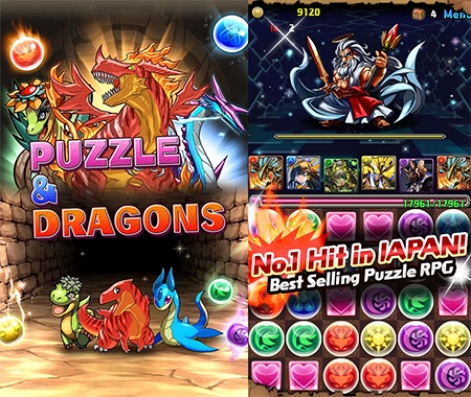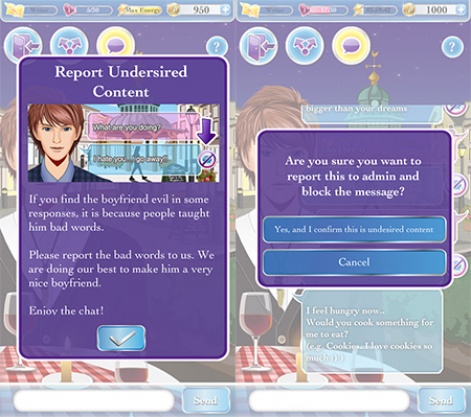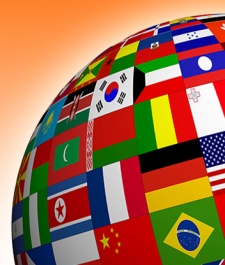What can a developer do to trigger a 128 percent increase in downloads and a 26 percent jump in paid customers in one country in one single week?
It might sound obvious, but translating your game into a country's native language can, if done well, open it up to large audiences almost immediately. Nevertheless, it's an element many developers choose to overlook, simply pushing out English versions internationally.
A report by Distimo in October 2012, however, emphasised the importance of translating apps into other languages, particularly in Asian markets, where English language games very much play second fiddle to native language releases.
But, is translating a game accurately all that easy? Considering how readily a developer's resources can become stretched merely working on an English version of game, the idea of working on additional international editions can seem daunting.
So, as the next part of our 5 simple step series, we thought we'd put together this guide on how to painlessly translate your title and kick yourself along the path to world domination quicker than you can say "parlez-vous francais?"

Choose your markets carefully
When kicking off the translation process, you need to pin down just which markets you're looking to target.
The temptation, of course, is to aim your game at the biggest markets across Europe, the Americas and Asia, but opting to pitch your game in a territory at odds with its content, design or genre can be a particularly fruitless ordeal.
A good example of this is the Asian market. Dr Serkan Toto, an apps consultant specialising in the Japanese market, knows all about the unique challenges faced by western developers looking to make a move on Japan, and claims that beyond mere translation developers need to be prepared to go the extra mile to succeed.
"I would strongly recommend developers to think about the suitability of the game in question for the Japanese market before thinking about localisation and translation," says Toto. "Not all games, even those that are phenomenally successful in other markets, have chances to make it in Japan.
"If in doubt, don't come. Marketing is expensive, customer support has to be in Japanese only, and the competitive landscape is fierce. These are all factors that should be considered early and may mean it isn't suitable for you to push your app there."

Japan is still recovering from 'PuzDra Shock'. Could your game take it on?
Such advice shouldn't put you off expanding beyond English-speaking nations altogether, however. Some genres popular in
North America and the UK, for example, are a perfect for overseas markets an RPG or card battler, for instance, would be idea for Japan and would have every chance of success, making translating it into Japanese a rather logical move.
If such a link isn't so obvious, however, there are some simple ways to find out whether your target market has a hunger for the type of game you're offering.
Use tools like App Annie to scan the charts in search of titles similar to yours, check your download figures to see if you've got any users somewhere unexpected and then work out which countries and therefore languages to translate into on the basis of your research.
If even that sounds like too much work, there are some staple languages that will aid your expansion overseas regardless of your chosen genre.
It's well worth translating English apps into both French and Spanish as a first step the former opening up parts of Canada, the later South America, which is in the process of switching from feature phones to smartphones as we speak.
German is also a good candidate, with Germany playing host to what is typically a high spending gamer driven market.
Hire carefully

Choosing the right person to translate your work is crucial to getting the most out of your localisation efforts.
The temptation may be to go and find the first person who can speak the language in question and sign them up for a cheap and cheerful feel, but such routes are fraught with danger even the slightest mistranslation risks alienating large portions of players, leaving your userbase utterly confused or, in a worst case scenario, saying something offensive.
Translating a game isn't just about switching words, but also being aware of cultural sensitivities.
As such, hiring a decent translator represents value for money. They're going to have the professional mind set and skills to properly interpret your work into the context of another culture.
They should also be receptive to your detailed instructions your moves to protect the elements of your game that, excuse the pun, risk getting lost in translation which, on a professional level, they'll be bound to follow.
Also, it's worth noting here that hiring a translator isn't necessarily as expensive as you think it is.
In the UK, rates often come in at around 10p (around 15c) or £60-70 per 1,000 words, equal to around $95-100. If you game is especially text light, that means you could round all costs off including translating your App Store description page, amongst other things for little over £100, or $160.
Communicate your app's tone properly
Whether you're William Shakespeare or just a coder in a bedroom, there's one universal truth about translation that everyone has to put with: the words you've slaved over will never be translated 100 percent accurately.

A combination of factors - English words not existing in other languages, sentence structures that are slightly askew and the odd colloquialism that simply doesn't make sense beyond a country's borders - mean changes to your copy are not only likely, but entirely necessary.
What you need to focus on, therefore, is ensuring not a direct word-for-word translation, but rather making sure whoever is translating your game understands the tone or theme you're trying to communicate.
Whether you're going for a zany surrealism or a gritty realism, letting your translator know in detail what your angle and influences are is going to aid the translation process.
Jumping back to point 1, it may also highlight whether your game's tone is appropriate for your target market. If you're working on a gritty crime thriller, for instance, it may be worth finding out whether TV shows or films with similar content have made an impression in the region.
Was the US drama that so inspired your game ever broadcast in your target market? If so, was it popular? And, if not, why not? Did it touch on themes that just don't translate well in the region?
At this stage, any information you can gather about the likes or dislikes of a particular country will help you. It may even be possible to subtly edit the script in translation, making a previously unsuitable game far more palatable to the tastes of its new audience without going back to the drawing board entirely.
The main thing, therefore, is to make sure that you can communicate your app's tone properly and effectively to your translator. Christine Cawthorne, director of Crocstar Media, offers more insight:
"It's important to do this so that people recognise and identify with your brand," says Cawthorne.
"If the tone creates an emotional connection with a person they are more like to come back. You want them to enjoy spending time in your app and distinctive, funny or comfortable language can help with this.
"As for giving your translators advice, providing them with a description of your target audience and how you usually talk to them is a great way to start. Sometimes a list of 'allowed' and not allowed' words is useful and you providing a style guide for people to refer to is always useful, whether you create your own or borrow one from somewhere like the BBC or The Guardian."
Provide resources - lots of them
Ever tried to give someone directions on the street without the aid of a map? Then you'll be aware of the baffled bemusement that lies in wait if you try to get a translator to work on your project without giving them as much information as possible to do their job properly.
Even with the best guide to your game's tone to hand, translators will always deliver a better final product if they have the game to hand or, at least, as much of it that exists.

This, of course, is much easier if you're looking to translate your game after it's already been released in other territories, but could prove tricky if you're working on a foreign version at the same time as the English release.
Nevertheless, the ability for a translator to visualise as much of your game as possible is crucial. When you say a string needs to be short, it makes more sense for the translator to see the piddly amount of screen real estate in order to understand what you're getting at.
When you say a character has a certain tone of voice, they're more likely to understand why if they've played from his or her perspective. And so forth.
What you need to do, therefore, is try your best to load up translators with as many resources as possible.
There are two levels to this. The first is what we could call the 'structural layer,' which covers all the documents and resources they'll translate into.
Creating easy to use spread sheets or web pages with coherent document names, adding notes to any potentially confusing strings and setting clear achievable deadlines will help them work and make sure you don't miss any deadlines: essential for when you're getting near to the launch.
The second thing to do is to make sure they've got hold of the game you're working on. Even if it is in beta or half finished, getting a copy of the app into the hands of the people working on it will help them understand the context of what they're translating as well as helping them avoid the dreaded " " of a truncated strings.
The same thing applies for the translation of other assets such as screenshots and the game's App Store description.
Especially important are those all-important keywords: you need to make sure your translator knows what you're aiming for so they can come up with the right keywords to guide organic search traffic to your app in their language.
Get the work checked
It's easy to see the translated work roll back into your spread sheets, inboxes and word documents and to assume the work is done but hold your horses.
If you don't get things checked, then you're taking the translator at their word. You need to be sure that games with your name on them have had your vetting and approval.
That's also the view of Robert Lo Bue, head of mobile app translation service App Lingua, who believes it's the developer's responsibility to ensure the translation is fit for purpose.

Failing to take charge of its translated content landed Boyfriend Maker in a lot of trouble
"Getting the text in your app translated is only half the battle," says Lo Bue.
"Games often rely heavily on instructions or narrative: if the translation is wrong and the text a player sees may be totally different from what's on screen."
So how can you get past such problems? This is when those friends and family who speak another language you originally shunned for the translation itself can come in handy. In fact, anyone you can get who speaks the language in question to check your work - whether face to face or via Twitter can do the job.
They may not have the professional skills to translate the game from beginning to end, but they'll be able to quickly check if the tone sounds right, if there are any outrageous spelling mistakes or truncation within your release. And, more to the point, they can make sure that if you've spent any money on translating that it has been well spent.

Bring the above point together with the previous four, and you'll be well on your way to breaking into a new market and most crucially - getting your game into the hands of a fresh batch of consumers.
Was this useful? Check out our other 5 simple step guides, 5 simple steps to the perfect app store screenshots and 5 simple steps to the perfect app store description.

















